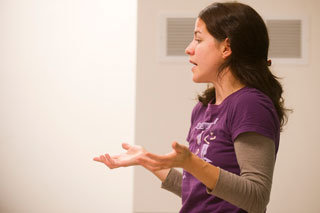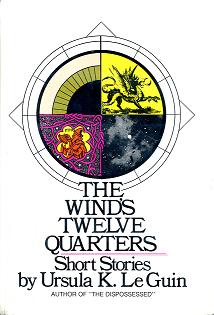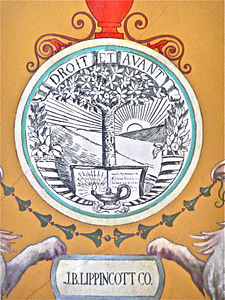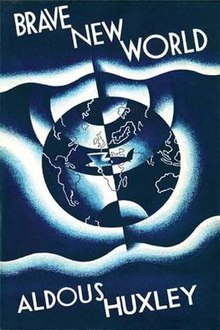What science fiction teaches us about the real world

Joelle Renstrom credits the ’90s TV dramedy Buffy the Vampire Slayer with changing her attitude to science fiction. A creative writing major at college, her aspiration was to pen the next Great American Novel (“I was kind of snobby about it,” she says), but halfway through her junior year, she was struck down with the flu and couldn’t get off the couch. A Buffy marathon was on, and while Renstrom had never seen the show, its title gave her the impression that it would be ridiculous, she says. “But as I watched 10 hours of Buffy, it changed what I think of as emotionally significant storytelling.”
Under the show’s campy premise—high school cheerleader Buffy Summers is destined to defend the world against vampires—Renstrom discovered a coming-of-age story that tackled real-life issues like friendship and betrayal, love and loss. “Buffy is what made me realize that science fiction can make you cry,” she says. “It’s about so much more than vampires or zombies or aliens, and that was an ‘Aha!’ moment for me. I devoured as much sci-fi as I could.”
Today, Renstrom, a lecturer of rhetoric at CGS, is the author of a popular blog, Could This Happen?, which uses sci-fi as a way into approaching complex science: examining genetic cloning through horror movie mutant ants, exploring the potential social impact of virtual reality through Pokémon Go. And, she’s become a scholar of the science behind the fiction—she’s especially passionate about space exploration and artificial intelligence—and writes about topics such as phobias and colonizing Mars for publications like Astrobiology, Slate, the Washington Post, and the Daily Beast. In the classroom, Renstrom uses science fiction as a way to engage students in the thorny issues facing our society and our planet: climate change, cybersecurity, genetic modification.
She talked with Collegian about how science fiction can help us explore the big ethical questions of our age—and how she’d feel about going to Mars.
Collegian: What sparked your obsession with space?
Renstrom: Well, I’ll admit that at first it was space battles, but then it was the eye candy. You can go to the NASA website and scroll through the Hubble images. No nature photograph I have ever seen can hold a candle to intertwining galaxies.
But what draws me the most to space is how big it is, and how small we are. When I think my problems are so big, I can zoom out and be reminded that, in fact, they are not. I know some people find that scary, but I find that comforting and beautiful.
How did your passion for sci-fi and space lead you into writing for science publications like Astrobiology?
I started tracing elements in sci-fi, like the invention of robots or going to Mars, to historical technological events. I started my blog for fun, not because I ever thought I’d be a science writer. I can’t program a computer, I’m terrible at math—but there’s value, and the potential for upward mobility, in self-teaching. Everything I learned about space and robots those first few years, I found out myself by poring through journals and articles, watching videos, and attending events.
After a while, all these concepts started linking together, and I realized I actually knew what I was talking about, at least a little.
And you’re still self-teaching. Could you talk about the Launch Pad Astronomy Workshop—billed as space camp for writers—that you attended last spring?
It’s a program for established sci-fi writers, but there was also a board game designer, a video game writer, and an LGBTQIA+ romance writer with an astronaut character—it’s for anybody who would find more background on space helpful.
It was ten hours a day, with lab work. We went to an infrared observatory in Wyoming, and another observatory where we saw Jupiter and four of its moons. We wanted to learn enough about space that we could work in realistic details about eclipses, or when a star in a made-up system is going to go supernova, what that’s going to look like.
People learn a lot of space knowledge from sci-fi. For example, if you watch The Martian (2015), you actually learn true things about Mars. So, that means that there’s an onus on people who write about space or other technologies to represent things as accurately as possible.
Would you go into space?
The first time we got a photograph of our entire planet, there was this realization that every person who’s ever existed has been on this one sphere, and we have to take care of it. For that sort of experience, I would do it in a heartbeat. But would I live on Mars? Oh, hell no!
You mentioned our responsibility to take care of our planet, a message that comes through in a lot of your writing. You’ve become a space activist.
One of my focal points is asking ethical questions. We consider if, how, and when we can colonize Mars—but my questions are: “Should we? Do we have the right to? Are we going to mess up another planet the way we’ve messed up our own?” A lot of what I do is very protective of space because it’s pure and unsullied by humans for the most part, and I’m increasingly invested in keeping it that way.
At CGS, you teach rhetoric through the lens of sci-fi. Why this approach?
In 2006, I taught my first sci-fi course and it was so fun. We talked philosophy and politics and environmentalism and racism and sex—there was nothing we didn’t talk about. The students were so into it. That was the key to unlocking teaching for me.
Sci-fi gives you this backdoor entry into topics that are so heady and abstract that we can’t imagine them until we read a story or watch a movie, and then we realize, “Oh, I see how this might play out.” For example, it’s so much easier to talk about the ethics behind scientific motivation by first talking about what motivates Victor Frankenstein.
The students realize that Frankenstein is 200 years old, and these questions around the Industrial Revolution are the same questions we’re talking about now, although now the stakes are higher. You can really see over a length of time what has occupied us.
How does this realization engage students in the perils facing contemporary society?
Students are really quick to pick up on issues like, for example, how the divide between rich and poor is going to get bigger because of technology, especially when it comes to AI and genetic modification. Wealthy people can afford it, while people who aren’t wealthy can’t.
If you think about these topics long enough and hard enough—which is always what you’re trying to get students to do—you get to a point where they ask, “What are we going to do about this?”
Why is it important that we ask that question?
Aldous Huxley once said, “We mustn’t be caught by surprise by our own advancing technology.” It’s already happening—and we’re not thinking about it enough. Do you want Apple to have all your data? How much control do we want corporations to have when it comes to not just information, but privacy and other polices that overlap with government regulations. Everything about our society relies on science and technology, but so few people understand how it works.
What it does is undermine the democratic process because knowledge and understanding, and therefore power, is in the hands of a very few, the techno elite, and they’re controlling more and more, unbeknown to us. These are big stakes.
I always tell my students: I’m not trying to tell you not to get a robot or get your cellphone implanted in your brain, or whatever. I just want people to think hard about those stakes. Don’t go mindlessly into this future staring at your phone.
Renstrom recently joined the Faculty Innovation Network for Innovate@BU, where she helps enable students throughout BU to become entrepreneurs and innovators with real-world impact. She is also the author of Closing the Book: Travels in Life, Loss, and Literature.
This interview has been edited and condensed for clarity.
 Ray Bradbury,
Ray Bradbury, Octavia Butler,
Octavia Butler, Frank Herbert,
Frank Herbert,  Ursula K. Le Guin, “The Ones Who Walk Away from Omelas,” published in
Ursula K. Le Guin, “The Ones Who Walk Away from Omelas,” published in  Walter Miller,
Walter Miller,  George Orwell,
George Orwell,  Mary Doria Russell,
Mary Doria Russell,  Aldous Huxley,
Aldous Huxley,